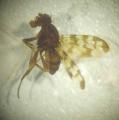Diptera.info :: Family forums :: Asilidae Forum
|
Asilidae ID France Provence
|
|
| Ectemnius |
Posted on 31-12-2012 13:14
|
|
Member Location: The Netherlands Posts: 865 Joined: 22.11.11 |
 Caught at forest edge sitting on shrubs, dead trees and people Is it possible to Identify the genus. And if so, what literature was used for that. And is there literature available to identify the species? Thnx, Ectemnius |
|
|
|
| christoophe |
Posted on 01-01-2013 20:40
|
|
Member Location: France Provence Posts: 2000 Joined: 06.02.08 |
Heteropogon sp. A side view to reassure me. |
|
|
|
| Dysmachus |
Posted on 10-02-2013 16:53
|
|
Member Location: Germany Posts: 321 Joined: 15.03.06 |
This is a Pycnopogon or Crobilocerus species. The latter has hairs on the last antennal segmant. |
| Ectemnius |
Posted on 11-02-2013 17:20
|
|
Member Location: The Netherlands Posts: 865 Joined: 22.11.11 |
Thanks both for your response! I have to agree with Dysmachus. I used Majer 1997 to key out the genus and there one can't key the specimens out to Heteropogon because the abdomen are broad and flat. I used Engel 1938 to key out the species. I come to Pycnopogon apiformis. This because of the white hairs on the thorax and abdomen and the darkened crossveins in the wing combined with the open cell M3. Lehr 1988 list the species for France. Do you guys agree with the identification? Do you know of any recent literature on the genus or its distribution? Greetings and Thanx again, Ectemnius |
|
|
|
| Malcolm Smart |
Posted on 06-04-2013 11:06
|
|
Member Location: Wolverhampton, UK Posts: 2 Joined: 26.05.04 |
Hi, I just came across this posting. The species in your picture is a male specimen of Pycnopogon fasciculatus. It has the quite definitive tufts of black hair on the distal half of the front and middle tibiae. The reddish colour visible on the hind tibia is also characteristic of this species (other species of the genus have black tibiae). Regards, Malcolm Edited by Malcolm Smart on 06-04-2013 11:06 |
|
|
|
| Jump to Forum: |













